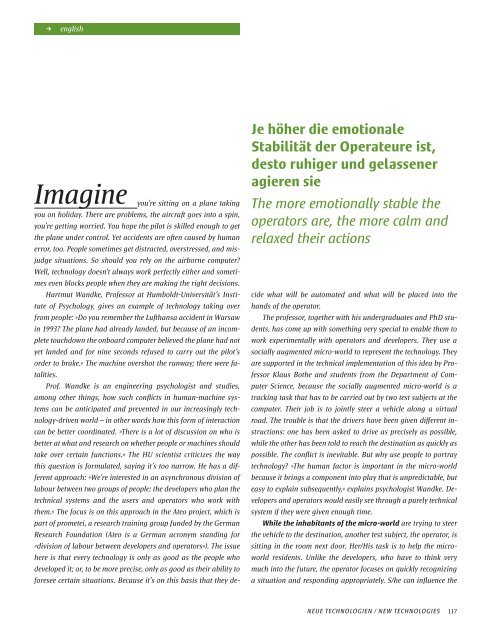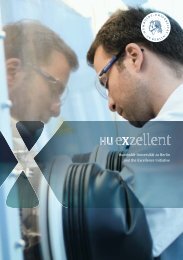hu wissen (pdf) - Exzellenzinitiative - Humboldt-Universität zu Berlin
hu wissen (pdf) - Exzellenzinitiative - Humboldt-Universität zu Berlin
hu wissen (pdf) - Exzellenzinitiative - Humboldt-Universität zu Berlin
Sie wollen auch ein ePaper? Erhöhen Sie die Reichweite Ihrer Titel.
YUMPU macht aus Druck-PDFs automatisch weboptimierte ePaper, die Google liebt.
k english<br />
Imagine you’re sitting on a plane taking<br />
you on holiday. There are problems, the aircra� goes into a spin,<br />
you’re getting worried. You hope the pilot is skilled enough to get<br />
the plane under control. Yet accidents are o� en caused by <strong>hu</strong>man<br />
error, too. People sometimes get distracted, overstressed, and misjudge<br />
situations. So should you rely on the airborne computer?<br />
Well, technology doesn’t always work perfectly either and sometimes<br />
even blocks people when they are making the right decisions.<br />
Hartmut Wandke, Professor at <strong>Humboldt</strong>-<strong>Universität</strong>’s Institute<br />
of Psychology, gives an example of technology taking over<br />
from people: »Do you remember the Lu� hansa accident in Warsaw<br />
in 1993? The plane had already landed, but because of an incomplete<br />
touchdown the onboard computer believed the plane had not<br />
yet landed and for nine seconds refused to carry out the pilot’s<br />
order to brake.« The machine overshot the runway; there were fatalities.<br />
Prof. Wandke is an engineering psychologist and studies,<br />
among other things, how such confl icts in <strong>hu</strong>man-machine systems<br />
can be anticipated and prevented in our increasingly technology-driven<br />
world – in other words how this form of interaction<br />
can be better coordinated. »There is a lot of discussion on who is<br />
better at what and research on whether people or machines should<br />
take over certain functions.« The HU scientist criticizes the way<br />
this question is formulated, saying it’s too narrow. He has a different<br />
approach: »We’re interested in an asynchronous division of<br />
labour between two groups of people: the developers who plan the<br />
technical systems and the users and operators who work with<br />
them.« The focus is on this approach in the Ateo project, which is<br />
part of prometei, a research training group funded by the German<br />
Research Foundation (Ateo is a German acronym standing for<br />
»division of labour between developers and operators«). The issue<br />
here is that every technology is only as good as the people who<br />
developed it; or, to be more precise, only as good as their ability to<br />
foresee certain situations. Because it’s on this basis that they de-<br />
Je höher die emotionale<br />
Stabilität der Operateure ist,<br />
desto ruhiger und gelassener<br />
agieren sie<br />
The more emotionally stable the<br />
operators are, the more calm and<br />
relaxed their actions<br />
cide what will be automated and what will be placed into the<br />
hands of the operator.<br />
The professor, together with his undergraduates and PhD students,<br />
has come up with something very special to enable them to<br />
work experimentally with operators and developers. They use a<br />
socially augmented micro-world to represent the technology. They<br />
are supported in the technical implementation of this idea by Professor<br />
Klaus Bothe and students from the Department of Computer<br />
Science, because the socially augmented micro-world is a<br />
tracking task that has to be carried out by two test subjects at the<br />
computer. Their job is to jointly steer a vehicle along a virtual<br />
road. The trouble is that the drivers have been given diff erent instructions:<br />
one has been asked to drive as precisely as possible,<br />
while the other has been told to reach the destination as quickly as<br />
possible. The confl ict is inevitable. But why use people to portray<br />
technology? »The <strong>hu</strong>man factor is important in the micro-world<br />
because it brings a component into play that is unpredictable, but<br />
easy to explain subsequently,« explains psychologist Wandke. Developers<br />
and operators would easily see through a purely technical<br />
system if they were given enough time.<br />
While the inhabitants of the micro-world are trying to steer<br />
the vehicle to the destination, another test subject, the operator, is<br />
sitting in the room next door. Her/His task is to help the microworld<br />
residents. Unlike the developers, who have to think very<br />
much into the future, the operator focuses on quickly recognizing<br />
a situation and responding appropriately. S/he can infl uence the<br />
NEUE TECHNOLOGIEN / NEW TECHNOLOGIES<br />
117



